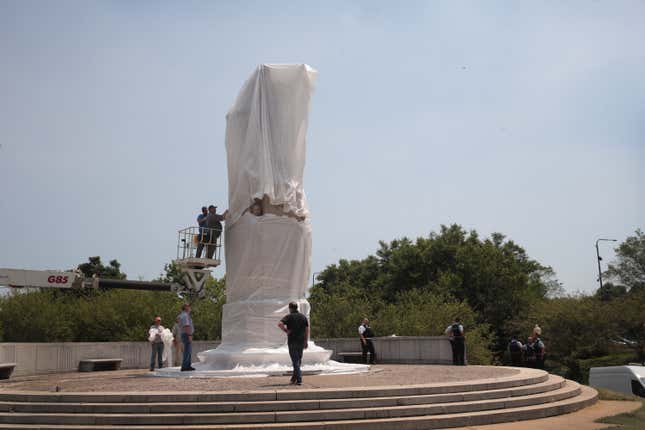
Chicago said arrivederci to its Christopher Columbus statues in the early hours of Friday morning, in response to protests “that have become unsafe for both protesters and police,” said Chicago Mayor Lori Lightfoot.
As WGN TV Chicago reports, construction crews used a large crane to remove the Grant Park Columbus statue at around 3 a.m., to the cheers of a small crowd that had gathered. The Little Italy Columbus statue was taken down at around 5:30 am.
According to a statement released by Lightfoot’s office, the city’s takedown of the two statues are considered temporary measures for now. The statues have been sites of conflict between law enforcement and protesters in the last few weeks, as demonstrators have vandalized and attempted to topple the monuments. Hailed in U.S. primary school textbooks as a great explorer, Columbus carried out horrendous acts of violence against indigenous peoples in the Caribbean, helping to usher in an age of genocide that would sweep across the Americas.
By removing the statues, the city of Chicago hopes to redistribute public safety resources (that is, police) in areas of the city that have seen surges in violence this summer. The city also plans to announce a formal review process for all public landmarks, including murals, monuments and memorials.
Here is Lightfoot’s full statement, courtesy of WGN TV:
The City of Chicago—at Mayor Lightfoot’s direction—has temporarily removed the Christopher Columbus statues in Grant Park and Arrigo Park until further notice. This action was taken after consultation with various stakeholders. It comes in response to demonstrations that became unsafe for both protesters and police, as well as efforts by individuals to independently pull the Grant Park statue down in an extremely dangerous manner. This step is about an effort to protect public safety and to preserve a safe space for an inclusive and democratic public dialogue about our city’s symbols. In addition, our public safety resources must be concentrated where they are most needed throughout the city, and particularly in our South and West Side communities.
Over the coming days, Mayor Lightfoot and the City will be announcing a formal process to assess each of the monuments, memorials, and murals across Chicago’s communities, and develop a framework for creating a public dialogue to determine how we elevate our city’s history and diversity. As the Mayor has stated previously, this is not about a single statue or mural, but how we create a platform to channel our city’s dynamic civic energy to collaboratively, purposefully and peacefully reflect our values as Chicagoans and uplift the stories of all of our diverse city’s residents, particularly when it comes to the permanent memorialization of our shared heritage.
While the use of “public safety resources” is broad, it’s fair to assume a substantial portion of these resources would include policing. Chicago police complained about exhaustion and burnout from working long shifts last month when they confronted Black Lives Matter protesters around the city. And as recent spikes in gun violence has claimed the lives of young Black people, the city is scrambling to figure out how to prioritize its personnel. Thomas Abt, a senior fellow at the Council on Criminal Justice, told the New York Times, “All of the people and organizations that we usually depend on to respond to homicide and violent crime are overburdened right now.”
The statue removal also comes after Lightfoot specifically requested that additional federal agents pouring into the city be tasked with fighting drug and firearms trafficking. Black Lives Matter Chicago and other social justice groups filed a civil rights lawsuit Thursday against several law enforcement agencies in an attempt to prevent federal agents from performing the kind of violent crackdowns on protests that have been on display in Portland, Ore.
“The lawsuit is seeking injunctive relief to restrain federal law enforcement officers from violating the First and Fourth amendments of protesters, legal observers and journalists,” attorney Tess Kleinhouse said at a news conference yesterday, according to the Chicago Sun-Times. Kleinhouse filed the civil suit, which names Acting Secretary of the U.S. Department of Homeland Security Chad Wolf as a defendant, among others.
Wolf claimed the injection of federal agents into Chicago is “something very different than what’s going on in Portland,” saying their focus will be gang crime, illicit narcotics and drug crime—things federal agencies already have a hand in.
“The Department of Justice, DEA, FBI and others, along with elements of the Department of Homeland Security, are working on those criminal investigations and those criminal activities every day. And they do that locally with law enforcement,” Wolf said, according to the Sun-Times. “And I think that will continue to operate pretty well.”
But activists and organizers like Aislinn Pulley, one of the founders of Black Lives Matter Chicago, are not convinced.
“They are trying to suppress our righteous anger, and we will not be suppressed, we will continue fighting back,” Pulley told protesters yesterday. “We see what’s happening in Portland, that was the first test case. And now it’s coming here.”

